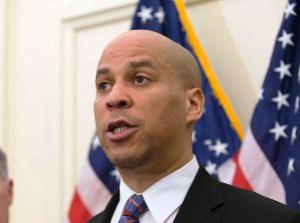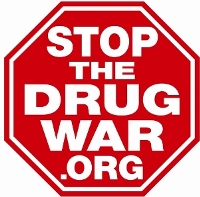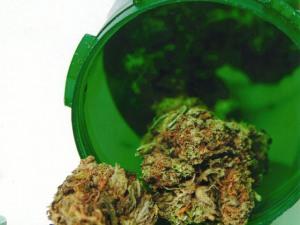Canada's "Prince of Pot" is finally out of prison in the US, back in Canada, and raring to go. The Chronicle interviewed him Monday.
A pair of strange political bedfellows have introduced a bill to reduce incarceration and help young offenders get past their youthful mistakes. Sens. Cory Booker and Rand Paul are sponsoring the REDEEM Act.
Now more than ever, StoptheDrugWar.org needs your financial support to continue to provide this crucial informational tool -- the Drug War Chronicle newsletter -- that builds and empowers the movement.
Popular hydrocodone-based pain relieving opiates such as Vicodin are being moved from Schedule III to Schedule II, which is going to significantly tighten up access to them.
ProCon.org is a series of in-depth web sites presenting information and views from on current issues, several with relevance to drug policy. The Chronicle is currently running a series of info items from ProCon.org -- this one from
dare.procon.org -- and we encourage you to check it out.
A study finds medical marijuana may reduce opiate overdose rates, a California appeals court decision is good news for dispensary operators, Connecticut gets its first dispensary, and more.
A Puerto Rican police drug agent shot and wounded in a raid last week died yesterday.
Sixteen dirty Puerto Rico cops take plea deals, a cocaine-dealing New Jersey prison guard goes to prison, a Houston cop gets busted in a cocaine deal, and a Massachusetts cop gets caught trying to fill a Ritalin prescription using a false identity.
Oregon Dems just say yes, Connecticut's first dispensary opens, the DEA tightens the screws on Vicodin, guess who's more likely to get busted for marijuana in Ferguson, Missouri, and more.
It's back to the drawing board for an Arkansas legalization initiative, we have a pair of Minnesota court cases, the Michael Brown killing starts bleeding into drug-policy related areas, Israel bans new synthetics, and more.
The Oregonian says legalize it, so do Vermont GOP gubernatorial candidates, LEAP founder says legalize heroin, a Pennsylvania court throws out mandatory minimums, Vancouver's SALOME participants will get their heroin, and more.
Medical marijuana's link to opioid overdose death rates, International Overdose Awareness Day is coming, the drug war claims another victim, new studies from the NIJ, and more.
Local marijuana initiatives move forward, the Oregon initiative is set to get a high-profile endorsement, a lot of people want to start medical marijuana businesses in Nevada, ISIS is burning pot fields in Syria, there's a harm reduction pre-event ahead of NYC's Electronic Zoo festival this weekend, and more.
There are paid and volunteer opportunities in the movement at a range of organizations.
Canada's "Prince of Pot" Marc Emery has finally returned home after spending just over 4 ½ years in US federal prison for selling marijuana seeds over the Internet. From his base in Vancouver, BC, Emery parlayed his pot seed profits into a pro-marijuana legalization political juggernaut.

Marc and Jodie Emery (wikipedia.org)
Not only did the gregarious former libertarian bookseller relentlessly hassle Canadian and American drug warriors -- including the dour then-drug czar, John Walters -- he published
Cannabis Culture magazine, created the BC Marijuana Party and helped turn parts of downtown Vancouver's
Hasting Street into a Western Hemisphere Amsterdam, complete with a vaporizer lounge and several other cannabis-related enterprises.
Emery also put a bunch of his money -- several hundred thousand dollars -- into financing marijuana reform efforts on the US side of the border. It's hard to say what, exactly, got him in the sights of US law enforcement, but when he was arrested by Canadian police at the behest of US authorities, the DEA was quick to gloat that it had struck a blow against the forces of legalization.
The US eventually got its pound of flesh from Emery, forcing him into a plea bargain -- to protect his coworkers -- that saw him sentenced to five years in federal prison for his seed selling. Emery did his time, was released from prison earlier this summer, then sent to a private deportation detention facility in the US before going home to Canada less than two weeks ago.
But if US and Canadian authorities thought they had silenced one of the biggest thorns in their side, they should have known better. Nearly five years in prison hasn't exactly mellowed Emery; instead, he is more committed than ever to drug war justice, and he's raring to go.
The Chronicle spoke with him via phone at his home in Vancouver Monday. The topics ranged from prison life to marijuana legalization in the US to Canadian election politics and beyond.
"If you go to jail for the right reasons you can continue to be an inspiration," Emery said. "I got a lot of affirmation, thousands of letters, people helped to cover my bills, and that's a testament to my influence. My experience was very positive. I network well and try to live in the present moment, just dealing with what's going on."
Still, Emery needed about $180,000 to get through those 4 ½ years behind bars, including more than $18,000 in email costs -- it isn't cheap for federal prisoners to send emails -- but for Emery, keeping his voice heard in the outside world was a necessity. He reports having received between $70,000 and $80,000 in donations while in the slammer.
"That still left Jodie doing the near impossible," he said. She traveled from Canada to the southern US 81 times to visit her husband, visiting him on 164 days and spending a like amount of time in transit. If it weren't for Jodie Emery, prison would have been a much lonelier place, as it is for most inmates.
"In my prison, there were 1,700 prisoners, but on an average weekend, only 25 were getting a visit," Emery noted, adding that most inmates were either black or brown. "And other than Jodie, only seven people came to visit me."
While Emery waited in prison, the world continued to turn, and he has emerged into a different place. Now, two US states and Uruguay have legalized marijuana outright, and two more states and the District of Columbia are likely to do so this fall. For the Prince of Pot, it's all good.
"I like that Washington and Colorado went for two different models, although I think the Colorado model is better and has been more quickly executed," he said. "In both places, prices haven't really dropped, but they will once other states come on board. It has been really encouraging to see that people would travel to another state to buy it legally."
That's a good thing for the cannabis culture, he said.
"We are a proud culture. Legalization means a lot of things, and one of them is the end of stigmatization. We've been picked on and scapegoated as if we were taking part in some evil practice, but that is largely over in Denver," Emery argued. "They're integrating it into the mainstream economy; we're going to see a lot of interesting things."
Unsurprisingly, the small-L libertarian and marijuana seed entrepreneur is not overly concerned that legalization will lead to the commercialization or corporatization of the herb.
"We need big money in order to have an effective lobby," he said. "When there's something that tens of millions of Americans want, the money will come, and the money is welcome. It's going to put into new products, new technologies, and we have to welcome that. Capitalism is way to make things happen legally, and we need to get those people on board."
But Emery wants people to be able to grow their own, too.
"It's not legal unless we can grow it in our backyards or fields," he said, "and as long as we can grow it, it's basically legal."

The Hastings Street headquarters. (cannabisculture.com)
That's life in these United States, but Emery, of course, doesn't live in the United States -- in fact, he is now permanently barred from entering the country -- he lives in Canada, and things haven't gone nearly as swimmingly there when it comes to freeing the weed.
A decade ago, Canada was the hope of the global cannabis culture. It appeared poised to make the move toward legalization, but first the ruling Liberals were unwilling to even push through their decriminalization scheme, and then they were defeated by the Conservatives, who went in the other direction on marijuana policy, for instance, by adopting mandatory minimum sentences for growing more than small amounts of pot.
Stephen Harper's Conservatives remain in power today, and Emery has sworn political vengeance on them. He has also aligned himself with the Liberals, whose leader, Justin Trudeau, is now an advocate of legalization. That's in line with Canadian public opinion, which consistently shows strong support for marijuana law reform, including a poll this week that showed two-thirds support for reform, with 35% saying legalize it and 31% saying decriminalize it.
The Liberals are going to try to take back the federal government in elections in October 2015, and Emery is happy to help savage the Conservatives whether it makes Liberals squeamish or not. His return just two weeks ago has already ignited a firestorm of media coverage, with his pot politics naturally front and center.
"We've now hijacked the whole conversation about the election; we are dominating the conversation," he gloated. "It's the number one election topic and has been since the second I arrived back in the country. There have been more than 150 articles about me in the last two weeks. It's a big deal, and I'm delighted it's a big deal. I have critics using up column inches to say disparaging things about me, and that's great, too. There's a real dialog going on, and we have the opportunity to change the feelings of our opponents and get them to understand the benefits to their communities in legalizing marijuana."
But can the Liberals win? Yes, says Emery.
"Election day -- October 19, 2015 -- will be legalization day in Canada. If Trudeau becomes prime minister, there is no going back," he prophesied. "And I am confident the Liberals will win. Normally, the anti-Harper vote is divided among the Greens, the NDP, the Bloc Quebecois, and the Liberals, but this time, with Trudeau being so charismatic, I am urging everyone to just this once vote for the Liberals. And the feedback I am getting is that this is going to happen, a Liberal majority is going to happen, and you should be in on it."
When it comes to marijuana reform, in Emery's eyes, Canadian politicians should take a lesson from their counterparts south of the border.
"My opinion of Americans has only improved," he said. "You did a great job in Colorado and Washington, and even your legislators are underrated. At least one from every state has gone to Colorado to check it out. It's wonderful! Up here, if it weren't for Justin Trudeau, we wouldn't hear anything."
Well, and now, Marc Emery. Again.
back to top
A pair of US senators from opposite sides of the political spectrum have teamed up in a bid to fix "the nation's broken criminal justice system." Sens. Cory Booker (D-NJ) and Rand Paul (R-KY) earlier this summer introduced the Record Expungement to Designed to Enhance Employment Act, generally referred to as the REDEEM Act.

The REDEEM Act aims to help young offenders break the cycle of criminal justice system involvement. (samhsa.gov)
While observers say the bill is unlikely to pass this year, its introduction lays the groundwork for moving forward on it in the next Congress.
The act, Senate Bill 2567, its sponsors say, is designed to give people convicted of nonviolent offenses, including drug offenses, a second chance at succeeding. It also aims to divert many teenagers out of the adult criminal justice system.
Booker, a black northeastern liberal, and Paul, a libertarian-leaning southern conservative, may appear to be strange bedfellows, but both said fixing the criminal justice system was more important than partisan rivalries in statements made when the bill was introduced.
"I will work with anyone, from any party, to make a difference for the people of New Jersey, and this bipartisan legislation does just that," Sen. Booker said. "The REDEEM Act will ensure that our tax dollars are being used in smarter, more productive ways. It will also establish much-needed sensible reforms that keep kids out of the adult correctional system, protect their privacy so a youthful mistake can remain a youthful mistake, and help make it less likely that low-level adult offenders re-offend."
"The biggest impediment to civil rights and employment in our country is a criminal record," said Sen. Paul. "Our current system is broken and has trapped tens of thousands of young men and women in a cycle of poverty and incarceration. Many of these young people could escape this trap if criminal justice were reformed, if records were expunged after time served, and if nonviolent crimes did not become a permanent blot preventing employment."
Even though the United States contains only 5% of the world's population, it contains 25% of the world's prisoners. US prison populations have more than tripled since the Reagan administration in the 1980s, largely under the impetus of the war on drugs. American taxpayers have seen their bill for mass incarceration rise from $77 each per year in when Reagan took office in 1980 to more than $260 each per year in 2010.
The REDEEM Act would seek to reduce those costs by reforms that would divert juvenile offenders from adult courts, improve the conditions for juvenile offenders, allow some adult offenders a means to expunge their records, and allow adult drug offenders who have done their time to be eligible for benefits they are now barred from obtaining.
The act would:
- Incentivize states to increase the age of criminal responsibility to 18 years old: Currently 10 states have set the original jurisdiction of adult criminal courts below 18 years old. The REDEEM Act incentivizes states to change that by offering preference to Community Oriented Policing Services (COPS) grant applications for those that have set 18 or older as the age of original jurisdiction for adult criminal courts.
- Allow for sealing and expungement of juvenile records: Provides for automatic expungement of records for kids who commit nonviolent crimes before they turn 15 and automatic sealing of records for those who commit non-violent crimes after they turn 15 years old.
- Restrict use of juvenile solitary confinement: Ends the practice of solitary confinement except in the most extreme circumstances in which it is necessary to protect a juvenile detainee or those around them.
- Offer adults a way to seal non-violent criminal records: Presents the first broad-based federal path to the sealing of criminal records for adults. Non-violent offenders will be able to petition a court and make their case. Furthermore, employers requesting FBI background checks will get only relevant and accurate information -- thereby protecting job applicants -- because of provisions to improve the background check system.
- Lift the ban on SNAP and TANF benefits for low-level drug offenders: The REDEEM Act restores access to benefits for those who have served their time for use and possession crimes, and for those who have paid their dues for distribution crimes provided their offense was rationally related to a substance abuse disorder and they have enrolled in a treatment program.

Cory Booker
While the bill was filed last month, it remains a work in progress. A number of advocacy groups, including the
Sentencing Project, the
Open Society Foundations, the
Drug Policy Alliance, and the
Interfaith Criminal Justice Coalition have been meeting with Booker and Paul staffers in an effort to make it even better. That work continues.
"A lot of the criminal justice and civil rights and faith groups and the Legal Action Center have been involved in trying to develop legislation like this and are supportive of at least parts of the REDEEM ACT," said Jeremy Haile, federal advocacy counsel for the Sentencing Project. "Both senators have said they are willing and want to hear from advocates about how to make the bill better. We've been doing that," he noted.
"We'd like to see it strengthened in some areas in terms of the repeals of bans for people with felonies getting federal benefits, as well as Pell grants and housing benefits. We'd like to see the bill expanded to take away those bans on services as well because they are all counterproductive for a safer reentry when people are released from prison," Haile continued.
While the bill has been described as a comprehensive criminal justice reform bill, Haile said, it really addresses a few distinct areas around the repeal of bans on benefits, as well as the juvenile justice measures.

Rand Paul
"Repealing the SNAP and
TANF bans for people with drug offenses is something we're really interested in," he said. "As it is, the bill will be especially beneficial for people with drug possession and use offenses. People with drug distribution offenses will have to show they have taken advantage of drug treatment and other things."
There is still time to make the bill stronger, Haile said, especially given partisan gridlock and upcoming midterm elections.
"Given that it's an election year and the lack of progress in Congress on just about everything, it's probably not going to pass before the election," he predicted. "But the bill sponsors are very committed to trying to advance it, if not during this session or during the lame duck, then they will reintroduce it next year."
In the meantime, the country and the economy will continue to suffer the effects of over-criminalization and over-incarceration, Booker said.
"Our country's misguided criminal justice policies have placed an economic drag on communities in both of our states, and on our nation's global competitiveness -- all while making us less, not more, safe," he proclaimed.
back to top
Dear friend of drug policy reform,
StoptheDrugWar.org needs your support more than ever before to continue our work of getting the word out online for the drug policy reform movement, building the movement, and providing this crucial informational tool -- the Drug War Chronicle newsletter -- that reformers around the world use in their work every day. I ask your support at this time with the most generous donation you can afford to enable this newsletter to continue. To donate -- and to view or order any of the gift items we offer, please use our online donation form at http://stopthedrugwar.org/donate, or scroll down for info on donating by mail.
Note that donations to StoptheDrugWar.org can be tax-deductible, supporting our educational work, or non-deductible, supporting our lobbying work. (Note that selecting any gift items reduces the amount of your donation that is deductible -- which with a smaller gift amount can be most of it.) Donations can be made by credit card or PayPal at http://stopthedrugwar.org/donate, or sent by mail to P.O. Box 9853, Washington, DC 20016. If you are donating by check, please make it payable to DRCNet Foundation (if tax-deductible) or Drug Reform Coordination Network (if not deductible). If you wish to donate stock, the information to give your brokerage is Ameritrade, (800) 669-3900), DTC#0188, and account number 781926492 for tax-deductible gifts or 864663500 for non-deductible gifts -- please make sure to contact us if donating in this way.
Thank you for standing with us to stop the drug war's cruelties and meet the opportunity this time offers to make a brighter future.
Sincerely,

David Borden, Executive Director
StoptheDrugWar.org
Washington, DC
http://stopthedrugwar.org
back to top
It is about to get more difficult to obtain popular pain medications based on hydrocodone, including widely prescribed drugs such as Vicodin. The DEA announced today that it is moving hydrocodone combination drugs from Schedule III of the Controlled Substances Act (CSA) to Schedule II.
Drugs containing only
hydrocodone were already placed on Schedule II, but drug combinations containing
hydrocodone plus other substances, such as aspirin or acetaminophen, have been Schedule III since the CSA was passed in 1970.
The DEA will publish the final rule establishing the change in the Federal Register tomorrow. It will go into effect in 45 days.
This is the end result of a rescheduling request first submitted in 1999, and another indication of retreat from the looser prescribing of opiate pain medications that began about 15 years ago. It comes as prescription overdose deaths and rising levels of heroin addiction are sparking public and official concern.
"Almost seven million Americans abuse controlled-substance prescription medications, including opioid painkillers, resulting in more deaths from prescription drug overdoses than auto accidents," said DEA administrator Michele Leonhart. "Today's action recognizes that these products are some of the most addictive and potentially dangerous prescription medications available."
Moving these hydrocodone combination products to Schedule II will significantly tighten access to them. Patients will not be able to get refills on the same prescription, but will have to go back to the doctor's office to get another one. Doctors will no longer be able to call in prescriptions. And pharmacies will have to store the drugs in secured vaults.
"This is substantial," said Dr. Nathaniel Katz, assistant professor of anesthesia at Tufts University School of Medicine in Boston. "It's a sign of a shift toward more cautious opioid prescribing. This will be an inconvenience to some, but policy is a machete not a scalpel and you have to figure out where to use it. I think people will be more helped than harmed," he told the New York Times.
But Dr. John Mendelson, a professor of medicine at the University of California-San Francisco, and an addiction specialist, told the Times he thought the change would lead to an increase in prescriptions of other drugs such as oxycodone, and a rise in the use of heroin.
Other pain management experts have yet to offer opinions, but there is likely to be criticism that the move will create more obstacles for chronic pain sufferers, including those who have problems making it to the doctor's office for a visit to get a prescription written. As many as 100 million Americans suffer from chronic pain, according to a 2011 study from the Institute of Medicine.
back to top
Did you know the D.A.R.E. (Drug Abuse Resistance Education) program was excluded from the Dept. of Education's "National Registry of Evidence-based Programs and Practices" until 2009, because it didn't have a "scientifically tested," "evidence-based" curriculum? Read the details on dare.procon.org, part of the ProCon.org family.
Follow Drug War Chronicle for more important facts from ProCon.org over the next several weeks, or sign up for ProCon.org's email list or RSS feed.
Read last week's ProCon.org "Did You Know" Chronicle blurb here.
ProCon.org is a web site promoting critical thinking, education, and informed citizenship by presenting controversial issues in a straightforward, nonpartisan primarily pro-con format.

back to top
A study finds marijuana may lower opiate overdose rates, a California appeals court decision is good news for dispensary operators, Connecticut gets its first dispensary, and more. Let's get to it:
NationalOn Monday, a JAMA study found that medical marijuana states have lower opiate overdose death rates than non-medical marijuana states. States with medical marijuana laws have rates of opiate overdose deaths 25% lower than states that don't, the Journal of the American Medical Association report found. The article is Medical Cannabis Laws and Opioid Analgesic Overdose Mortality in the United States, 1999-2010.
Arizona
Last Friday, Arizona medical marijuana advocates filed a lawsuit over PTSD treatment restrictions. The Arizona Cannabis Nurses Association filed the lawsuit challenging limits imposed on patients with PTSD who seek to use medical marijuana. Health Director Will Humble has ruled that PTSD patients can only use medical marijuana if they are already getting some other form of treatment for PTSD. The lawsuit is in Maricopa County District Court.
California
On Wednesday, a state appeals court overturned a dispensary operator's marijuana sale conviction in what is being described as "a major victory" for dispensary operators. Borzou Baniani had been denied the opportunity to present an affirmative defense -- that he was operating a dispensary within state law -- and the appeals court called that an error. Read the decision here.
Connecticut
Last Wednesday, Connecticut got its first medical marijuana dispensary. Prime Wellness of Connecticut opened in South Windsor. It is the first of six dispensaries approved for licenses by the Department of Consumer Protection. The rest will be opening in coming weeks or months.
Illinois
Last Friday, Illinois announced it is seeking nominees for the Medical Marijuana Advisory Board. The state medical marijuana program is looking for health professionals and patients to serve on its advisory board, which will be appointed by the governor. For more information, visit the Illinois Medical Cannabis Pilot Program.
Kansas
Last Saturday, the state Democratic Party endorsed medical marijuana. Kansas Democrats now formally support medical marijuana, they announced during their statewide Demofest convention Saturday night. "Kansas Democrats support the availability of marijuana for medical use and protection of patients from criminal arrest and prosecution." the plank says. The platform link wasn't working as of Wednesday, but you can try it here.
Maryland
On Tuesday, proposed medical marijuana rules came under heavy fire. The state commission charged with writing the rules for medical marijuana in the state heard an earful from physicians, patients, advocates, and potential growers at a hearing Tuesday. They criticized the proposed rules as too burdensome and vague, and said they would preclude a dispensary from operating anywhere in the city of Baltimore. The commission has three weeks to finalize the rules, and the hearing in Annapolis was the first public hearing.
Nevada
On Tuesday, state officials announced that more than 500 people had applied for licenses for medical marijuana businesses. The state has received applications from more than 500 people to run dispensaries, grows, testing labs, and edible and infused product companies. Under a new state law, up to 66 medical marijuana businesses will be licensed. State officials will score the applications and announce their selections in November, with the first medical marijuana sales expected early next year.
New Mexico
On Monday, the state Cannabis Medical Advisory Board held a public hearing on proposed new rules. The MAB is frustrated that the Department of Health did not formally consult with it before releasing proposed rule changes, which have garnered unhappy responses from patients and providers.
[For extensive information about the medical marijuana debate, presented in a neutral format, visit MedicalMarijuana.ProCon.org.]
back to top
A Puerto Rico police officer shot during a drug investigation last week has died. Agent Geniel Amaro Fantauzzi becomes the 30th person to die in US domestic drug law enforcement operations so far this year.

Do_Not_Cross,_Crime_Scene_91.jpg
According to
El Nuevo Dia,
Fantauzzi died Monday afternoon after being shot the previous Tuesday.
Fantauzzi, 35, a member of the Humaco Drug Division, was on a raid with four other agents at the April Gardens complex in Rio Piedra when he was hit by several bullets fired by one William Vazquez Tirado.
One other agent was wounded, but the wounds are not life-threatening.
It's not clear what happened to Vazquez Tirado.
back to top
Sixteen dirty Puerto Rico cops take plea deals, a cocaine-dealing New Jersey prison guard goes to prison, a Houston cop gets busted in a cocaine deal, and a Massachusetts cop gets caught trying to fill a Ritalin prescription using a false identity. Let's get to it:
In Westfield, Massachusetts,
an Adams police officer was arrested last Monday for allegedly using a false identity to fill a prescription for Ritalin. Officer Thomas Cook allegedly used a drivers' license he may have stolen from a suspect during an arrest. When the pharmacist called the name on the drivers' license to report the prescription was ready, the person denied having anything to do with it, so the pharmacist notified Westfield Police, who arrested Cook when he showed up bearing the other man's license. He is charged with uttering a false prescription, identity fraud, police or witness intimidation, receiving stolen property, and attempting to commit a crime.
In Houston, a Houston police officer was arrested last Thursday in a federal investigation of a one-kilo cocaine deal. Officer Jasmine Renee Bonner now faces cocaine possession and conspiracy charges. She has been relieved of duties pending outcome of an internal investigation and was jailed on a one million dollar bond.
In San Juan, Puerto Rico,16 Puerto Rico police officers pleaded guilty Monday to belonging to a crew that got together "to steal money, property, and drugs for their personal enrichment." They also admitted selling the drugs themselves and to taking bribes. They pleaded guilty to charges ranging from robbery to extortion. A sentencing date has yet to be set.
In Trenton, New Jersey, a former state prison guard was sentenced last Wednesday to 15 years in prison for his role in a cocaine trafficking conspiracy. Eugene Braswell, 35, was arrested in 2008 in connection with the shipment of 10 kilos of cocaine from Houston to New Jersey. The investigation into Braswell's activities began in 2007, when he shot and killed a man outside his Newark home.
back to top
Oregon Dems just say yes, Connecticut's first dispensary opens, the DEA tightens the screws on Vicodin, guess who's more likely to get busted for pot in Ferguson, Missouri, and more. Let's get to it:

coca plants (unodc.org)
Oregon Democratic Party Endorses Legalization Initiative. Oregon's Democratic Party has endorsed Measure 91, the New Approach Oregon marijuana legalization initiative. "A majority of Americans and large majority of Democrats now support state regulation of legal marijuana use," the party said. "Measure 91 is the right approach to legalization in Oregon, strictly regulating use while funding law enforcement and schools. Vote Yes on 91."
No Decriminalization Vote in Toledo in November. Even though Northwest Ohio NORML turned in sufficient signatures to qualify a decriminalization initiative for the local ballot earlier this month, voters will not have a chance to get their say in November because the city council failed to act by today. The council doesn't have another meeting set until last week. It's unclear if the initiative is now dead, or if it will go on the ballot at a later date.
Medical Marijuana
Connecticut Gets First Medical Marijuana Dispensary. The first dispensary in the state opened Wednesday night in South Windsor. Prime Wellness of Connecticut is the first of six dispensaries approved for licenses by the Department of Consumer Protection. The rest will be opening in coming weeks or months.
Prescription Opiates
DEA Tightens Rules on Popular Pain Relievers. It is about to get more difficult to obtain popular pain medications based on hydrocodone, including widely prescribed drugs such as Vicodin. The DEA announced today that it is moving hydrocodone combination drugs from Schedule III of the Controlled Substances Act (CSA) to Schedule II. Drugs containing only hydrocodone were already placed on Schedule II, but drug combinations containing hydrocodone plus other substances, such as aspirin or acetaminophen, have been Schedule III since the CSA was passed in 1970.The DEA will publish the final rule establishing the change in the Federal Register tomorrow. It will go into effect in 45 days.
Law Enforcement
Blacks in Ferguson, Missouri, More Than Three Times More Likely Than Whites to Be Arrested for Marijuana Possession. In its podcast this week, Missouri drug reform group Show-Me Cannabis points to the drug war connection in the tensions between police and residents in the predominantly black St. Louis suburb of Ferguson, plagued by more than 10 days of unrest since the killing of unarmed black teenager Michael Brown. Show-Me's John Payne points out that black residents of Ferguson are 3.25 times more likely to be arrested for marijuana possession than whites. Click on the title link to listen to the podcast.
International
West Africa Drugs Commission Head Says Region Must Step Up, Deal With Political Weakness. Former Nigerian President Olusegun Obasanjo, who also heads the West Africa Commission on Drugs, said countries in the region must confront their political and institutional weaknesses if they are to get a handle on the drug trade. "West Africa is no longer only a transit zone of drugs but an attractive destination where pushers take advantage of the weak political system to perpetuate their trade," he said during a meeting with Ghana's President John Mahama."We believe that we should confront openly the political and governance weaknesses which the traffickers exploit," Obasanjo said. "Drug barons can buy, they can do, and they can undo -- buy officials in the military, security and pervert justice." The commission has called on West Africa to decriminalize drug use and treat the issue as a public health problem.
Peru Aims to Eradicate 75,000 Acres of Coca Plants This Year. Peru's anti-drug agency, DEVIDA, says it has already eradicated 30,000 acres of coca plants this year and plans to eradicate another 45,000 acres by years' end. The eradication is being done manually and in tandem with $90 million crop substitution program. About 125,000 acres are under cultivation for coca. Peru is arguably the world's largest coca producer (vying with Colombia), and 90% of the crop is estimated to be destined for the illicit cocaine trade.
Venezuela Has Shot Down at Least Three Suspected Drug Planes in Last Year. At least three planes flying out of Mexico and suspected of carrying drugs have been shot down over Venezuela since last November. This Vice News report goes into detail on the search for one of the missing pilots.
back to top
It's back to the drawing board for an Arkansas legalization initiative, we have a pair of Minnesota court cases, the Michael Brown killing starts bleeding into drug-policy related areas, Israel bans new synthetics, and more. Let's get to it:

history repeats itself (image is of and infamous 1914 NYT editorial)
Arkansas Attorney General Rejects Wording for Legalization Initiative. Attorney General Dustin McDaniel has rejected the proposed wording for a prospective 2016 legalization initiative, the Cultivate Hemp and Regulate Marijuana Amendment. The name and ballot title are ambiguous and have "misleading tendencies," McDaniel wrote. Read the opinion here.
Fewer Than One in Five New Yorkers Oppose Marijuana Reform. According to a new Quinnipiac Poll, only 19% of New Yorkers oppose legalizing marijuana for personal or medical use, while 44% say it should be available for medical purposes and another 35% say it should be legal for personal use.
Asset Forfeiture
Minnesota Supreme Court Rules Evidence from Illegal Search Can't Be Used in Asset Forfeiture Proceedings. The state high court ruled Wednesday that evidence derived from a traffic stop that was determined to be unlawful cannot be used to seize someone's property. The court held that Fourth Amendment proscriptions against unlawful search and seizure apply to civil cases as well. The case is Daniel Garcia-Mendoza v. 2003 Chevy Tahoe.
Drug Testing
Minnesota Drug Testing Law's Worker Protections Don't Extend Outside State, Federal Court Rules. The state's Drug and Alcohol Testing in the Workplace ACT (DATWA) doesn't apply to state residents working or applying to work outside the state, a federal court has ruled. DATWA provides employees with the right to challenge positive drug test results and to try to seek treatment before being fired, but in Olson v. Push, Inc, the court ruled that those protections did not apply to drug tests taken for employment outside Minnesota.
Law Enforcement
SWAT Lobby Gears Up to Keep Access to Surplus Military Equipment. In the wake of unrest in Ferguson, Missouri, after the police killing of Michael Brown, the practice of equipping local law enforcement with surplus military equipment has come under significant criticism. Now the "SWAT lobby," in the form of the National Tactical Officers Association, is moving to ensure that access to military hardware remains unimpeded. It sent a mass email to all congressional offices lamenting the situation in Ferguson, but the bottom line was that police need that surplus military equipment.
Race
The Return of the Drug Crazed Negro. Reason magazine's Jacob Sullum has penned a piece noting the revival of a century-old racist trope -- that of the drug-crazed black man -- in the wake of the police shooting of 18-year-old black man Michael Brown in Ferguson, Missouri. Sullum notes that conservative commentators have been quick to speculate that he was hopped up on PCP or some other drug that made him crazy enough to attack a cop. Autopsy results say he had smoked marijuana.
International
Young Europeans Split on Marijuana Legalization. The European Union's polling arm Eurobarometer has found Europeans 15 to 24 divided on legalization. According to its poll of 13,000 respondents, 45% favored marijuana legalization, with 53% opposed. European youth was much more unified when it came to other drugs -- more than 90% said drugs like cocaine, ecstasy, and heroin should be illegal.
Israel Bans 10 New Synthetic Drugs. Health officials in Israel have banned 10 new synthetic drugs, or "kiosk drugs," as they are known there. They include synthetic cannabinoids, stimulants, and hallucinogens.
back to top
The Oregonian says legalize it, so do Vermont GOP gubernatorial candidates, LEAP founder says legalize heroin, a Pennsylvania court throws out mandatory minimums, Vancouver's SALOME participants will get their heroin, and more. Let's get to it:

Diacetylmorphine (pharmaceutical heroin) will soon be on its way to Vancouver. (wikimedia.org)
Oregon's Largest Newspaper Endorses Measure 91. In a Sunday editorial, the Oregonian has endorsed marijuana legalization in general and New Approach Oregon's initiative, Measure 91, in particular. Click on the title link to read the newspaper's reasoning.
Vermont GOP Governor Candidates Agree Marijuana Should Be Legal. In interviews with Vermont Public Radio, all three Republican gubernatorial candidates said they agreed that marijuana should be legalized. Steve Berry of Wolcott, Scott Milne of Pomfret and Emily Peyton of Putney are competing in tomorrow's primary. Peyton and Berry came out strongly for legalization, while Milne said he would sign a bill if it got to his desk. Milne is the leading contender.
Massachusetts Supreme Judicial Court Upholds Eviction of Public Housing Tenant for Marijuana Criminal Activity. With marijuana decriminalized in the state, can a public housing tenant still be evicted for possession of less than an ounce? That question remains undecided after the state's high court sidestepped it in Figgs v. Boston Housing Authority. A lower court had held that the tenant could not be evicted for simple possession, but the high court reversed, saying the facts in the case showed not just possession, but also that the tenant's roommate sold marijuana and possessed a weapon. Figgs is going to have to find a new place to live now.
Medical Marijuana
Arizona Advocates File Lawsuit over PTSD Treatment Restrictions. The Arizona Cannabis Nurses Association filed a lawsuit last Friday challenging limits imposed on patients with PTSD who seek to use medical marijuana. Health Director Will Humble has ruled that PTSD patients can only use medical marijuana if they are already getting some other form of treatment for PTSD. The lawsuit is in Maricopa County District Court.
Kansas Democratic Party Endorses Medical Marijuana. Kansas Democrats now formally support medical marijuana, they announced during their statewide Demofest convention Saturday night. "Kansas Democrats support the availability of marijuana for medical use and protection of patients from criminal arrest and prosecution." the plank says. The platform link wasn't working as of Tuesday night, but you can try it here.
Sentencing
Pennsylvania Superior Court Rules Mandatory Minimums Unconstitutional. In a decision last week, the court has thrown out the use of mandatory minimum sentences as violating the constitution. The ruling came in Pennsylvania v. Newman, where James Newman had received a mandatory minimum 5-year sentence for possession of drugs and a gun. Relying on a line of federal court decisions beginning with Apprendi v. New Jersey, the Superior Court held that, in sentences based on the elements of the crime, jurors -- not judges -- must find that those elements existed.
California Fair Sentencing Act Heads for Governor's Desk. After a final Senate concurrence vote last Thursday, the Fair Sentencing Act is now headed for the desk of Gov. Jerry Brown (D). The act, Senate Bill 1010, would eliminate the sentencing disparities between crack and powder cocaine offenses by reducing the penalty for crack offenses.
Heroin
Boston Globe Op-Ed Calls for End to Heroin Prohibition. A Sunday op-ed in the Globe published by former New Jersey narcotics officer and Law Enforcement Against Prohibition founder Jack Cole forthrightly calls for ending heroin prohibition. Police efforts to repress heroin "did more harm than good, and the harder my colleagues and I tried, the more damage we did," he writes. "As a police officer, I understand the instinct to mete out punishment, send a message, put somebody away for abusing drugs. Nonetheless, my experience has shown me that it is futile, counterproductive, and dangerous to try to arrest our way out of this very real problem." There's much more; click on the title link to read the whole thing.
International
Number of Disappeared in Mexico Keeps Rising. The number of people who have vanished since former President Felipe Calderon initiated his drug war in 2006 has increased to some 23,000, according to the Interior Ministry. More than 12,000 disappeared during the Calderon sexenio, and nearly 10,000 more have vanished during the first two years of the Enrique Pena Nieto presidency. Human rights groups say these official numbers are low.
Two-Thirds of Canadians Support Marijuana Law Reform. A new Forum Research poll finds that 66% of Canadians favor either legalizing and taxing marijuana or taking pot possession out of the criminal code (decriminalizing it). Some 35% said legalize it, while another 31% said decriminalize it. Only 16% said they were happy with the marijuana law status quo.
Canada's SALOME Study Will Get Prescription Heroin By Christmas. Vancouver heroin addicts participating in the Study to Assess Longer-term Opioid Medication Effectiveness (SALOME) will have legally prescribed heroin by Christmas, their attorney said last week. They won the right to use heroin as a maintenance drug after the BC Supreme Court in May granted them an injunction exempting them from a federal government ban on such uses. The pharmaceutical grade heroin is coming from a European manufacturer.
Australian National Council on Drugs Softens on Medical Marijuana. The Australian National Council on Drugs today released Medicinal Use of Cannabis: Background and Information Paper, which concedes that pharmaceutical marijuana products are effective for treating some forms of pain, reducing nausea, and helping people with wasting syndrome. The backgrounder comes as clamor grows, especially in Victoria, for legalizing medical marijuana.
(This article was published by StoptheDrugWar.org's lobbying arm, the Drug Reform Coordination Network, which also shares the cost of maintaining this web site. DRCNet Foundation takes no positions on candidates for public office, in compliance with section 501(c)(3) of the Internal Revenue Code, and does not pay for reporting that could be interpreted or misinterpreted as doing so.)
back to top
Medical marijuana may reduce opioid overdose death rates, International Overdose Awareness Day is coming, the drug war claims another victim, new studies from the NIJ, and more. Let's get to it:
Medical MarijuanaMedical Marijuana States Have Lower Opiate Overdose Rates, JAMA Study Finds. States with medical marijuana laws have significantly lower rates of opiate overdose deaths than states that don't, according to an article published Monday in the prestigious Journal of the American Medical Association. The article is Medical Cannabis Laws and Opioid Analgesic Overdose Mortality in the United States, 1999-2010.
Illinois Seeks Nominees for Medical Marijuana Advisory Board. The state medical marijuana program is looking for health professionals and patients to serve on its advisory board, which will be appointed by the governor. For more information, visit the Illinois Medical Cannabis Pilot Program.
New Mexico Cannabis Medical Advisory Board Holds Public Hearing on Proposed New Rules. The state's cannabis program's Medical Advisory Board (MAB) held a public hearing yesterday on proposed rule changes to the program. The MAB is frustrated that the Department of Health did not formally consult with it before releasing proposed rule changes, which have garnered unhappy responses from patients and providers.
Harm Reduction
August 31 is International Overdose Awareness Day. In Los Angeles, members of A New PATH (Parents for Addiction Treatment and Healing) are hosting an event at the Santa Monica Pier and Palisades Park. Click on the title link for more details. For details on other Overdose Awareness Day events, visit International Overdose Awareness Day.
Drug Testing
Maine Welfare Drug Test Program Gets No Support at Public Hearing. Health and Human Services Commissioner Mary Mayhew told a public hearing on Gov. LePage's (R) welfare drug testing plan that it was a "common sense approach," but no one else seemed to agree. The ACLU of Maine and Maine Equal Justice Partners vehemently differed. The drug testing scheme, which had been okayed in 2011, but which LePage just rolled now as he faces reelection, would require people with past felony drug convictions to be tested before being approved. A written public comment period is open through Sept. 7, after which Attorney General Janet Mills, a Democrat, will need to sign off on whether the final rule complies with federal law and the intent of the original state-level legislation.
Drugs and Crime
National Institute of Justice Releases Reports on Crime and Drugs. The National Criminal Justice Reference Service at the National Institute of Justice has released five technical reports on drugs and crime. They are: How Much Crime Is Drug-Related? History, Limitations, and Potential Improvements of Estimation Methods, Reducing Drug Violence in Mexico: Options for Implementing Targeted Enforcement, Measuring the Costs of Crime, Drug Control and Reductions in Drug-Attributable Crime, and Managing Drug-Involved Offenders. Click on the title link for more details.
Law Enforcement
Puerto Rico Police Officer is Year's 30th Drug War Fatality. Puerto Rican police officer Geniel Amaro Fantauzzi died Monday after being taken off life support six days after he was shot and critically wounded during a drug raid at a residence. He was an agent of the Humaco Drug Division.
International
Colombia Drug Policy Talks Get Underway. The National Dialog for the Future of Drug Policy got underway last Friday in Bogota. The meeting with members of academia, political groups, and unions is the first of 10 national and regional forums organized by the ministries of Justice, Health and Social Welfare, and Public Affairs. In the first forum, a survey of 61 recognized drug experts was presented, with all 61 saying drug policy "must change" and 42 of them considering current policy "ineffective, costly, and repressive."
back to top
Local marijuana initiatives move forward, the Oregon initiative is set to get a high-profile endorsement, a lot of people want to start medical marijuana businesses in Nevada, ISIS is burning pot fields in Syria, there's a harm reduction pre-event ahead of NYC's Electronic Zoo festival this weekend, and more. Let's get to it:
Marijuana PolicyCity Club of Portland Draft Report Endorses Oregon Legalization Initiative. The influential City Club of Portland has issued a draft report in support of Measure 91, the legalization initiative sponsored by New Approach Oregon. If approved by City Club members, the recommendation will be a powerful, high-profile endorsement of the measure. It picked up the endorsement of the state's largest newspaper, The Oregonian, on Sunday.
Santa Fe County Commission Approves Decriminalization Initiative, But…. The commission voted Tuesday to put the initiative on the November ballot, but questions remain about whether there is enough room on a crowded ballot to add the measure to it. State officials have outlined their concerns, but County Clerk Geraldine Salazar said she is confident those issues can be overcome. Stay tuned.
York, Maine, Activists Hand in Initiative Signatures. Citizens for Safer Maine is handing in more than 900 signatures today for its initiative that would legalize the possession of up to an ounce of marijuana. The initiative needs 641 valid voter signatures to qualify. The signature turn-in comes after town selectmen voted against putting the measure on the ballot.
Medical Marijuana
Maryland Medical Marijuana Rules Come Under Fire. The state commission charged with writing the rules for medical marijuana in the state heard an earful from physicians, patients, advocates, and potential growers at a hearing Tuesday. They criticized the proposed rules as too burdensome and vague, and said they would preclude a dispensary from operating anywhere in the city of Baltimore. The commission has three weeks to finalize the rules, and the hearing in Annapolis was the first public hearing.
More Than 500 Apply for Nevada Medical Marijuana Business Licenses. The state has received applications from more than 500 people to run dispensaries, grows, testing labs, and edible and infused product companies. Under a new state law, up to 66 medical marijuana businesses will be licensed. State officials will score the applications and announce their selections in November, with the first medical marijuana sales expected early next year.
Harm Reduction
DanceSafe to Do Harm Reduction Event Ahead of NYC Electronic Zoo Music Festival. The rave culture harm reduction group DanceSafe is hosting a "Surviving Zoo" event tomorrow night ahead of this weekend's Electric Zoo music festival. They will be giving away gift bags containing drug information cards, earplugs, and condoms, and will be offering personal drug testing kits for sale. Click on the link for more details. Last year, two people died from drug use at Electronic Zoo, and festival organizers have responded by adding more law enforcement and making attendees watch an anti-drug PSA before entering.
Drug Policy
British Drug Reform Group Transform Publishes Drug Debater's Guide. The Transform Drug Policy Foundation today made available Debating Drugs: How to Make the Case for Legal Regulation. "This is a guide to making the case for the legal regulation of drugs from a position of confidence and authority. Organized into 12 key subject areas, it provides an at-a-glance summary of the arguments for legal regulation, followed by commonly heard concerns and effective responses to them. It is the product of Transform's extensive experience debating the issues around legal regulation, and running workshops to equip supporters of reform with the arguments and nuanced messaging needed to win over a range of audiences." Check it out.
Drug Reform Funder John Sperling Dies. John Sperling, best known as the founder of the University of Phoenix, has died at age 93. Along with George Soros and Peter Lewis, Sperling was one of the troika of deep-pocketed funders whose financial support helped secure the passage of California's medical marijuana and sentencing reform initiatives (Prop 215 and Prop 36, respectively). He also helped fund Arizona's medical marijuana initiative, Prop 200.
Law Enforcement
Federal Court Says Lawsuit Over Fatal Connecticut SWAT Drug Raid Can Continue. A US federal appeals court has ruled that police cannot claim immunity to quash lawsuits filed in the wake of a botched 2008 raid that left one man dead and the homeowner wounded. In the raid, a heavily armed SWAT team shot and killed Gonzalo Guizan and wounded Ronald Terebesi as the two men were watching television. The ruling said that because police responded with unnecessary and inappropriate force, they are not protected by "qualified immunity." Police were responding to a claim by a stripper that she had seen a small amount of cocaine in Terebisi's home. They found only a personal use quantity of the drug and no weapon.
International
ISIS Burns Syrian Marijuana Fields. As if we didn't have enough reasons not to like these guys. Amateur video posted on the internet reportedly filmed recently in Akhtarin, near Aleppo, purportedly shows ISIS members burning a marijuana field. Syrian human rights observers reported that ISIS had captured the village from rival Islamists weeks ago. Click on the link to see the video.
Australia's Victoria Labor Party Vows Harsh New Laws Against Meth. The opposition Labor Party is hoping to gin up votes ahead of November's elections by vowing to crack down on meth if elected. Leader Daniel Andrews is calling for new criminal offenses to be enacted and penalties of up to 25 years in prison for sales to minors. New offenses would include writing or circulating meth "cookbooks" and owning or operating properties that "turn a blind eye" to meth production, as well as selling meth near a school.
back to top
There are job opportunities in the movement -- apply now to take your involvement to a new level!
The Drug Policy Alliance is hiring a Policy Associate for its Washington, DC office, working with the Deputy Director, Office of National Affairs on reform of federal drug policy.
The Marijuana Policy Project is hiring an Online Outreach Manager, responsible for developing and implementing MPP's online communications strategy.
Students for Sensible Drug Policy is offering a DC Campus Coordinator internship for the fall 2014 semester.
The International Drug Policy Consortium is seeking a Communications Volunteer who is willing to help with communications strategy for at least three months.
back to top
















